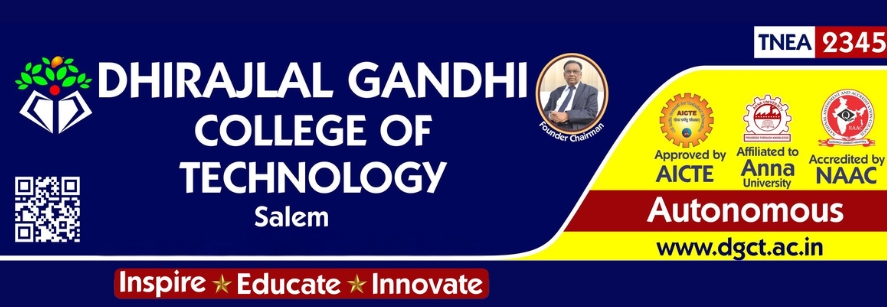
| Best Placements in 11 Consecutive Years |


Academy
Laboratory
Networking
Academy
BIG DATA
Laboratory
Computer graphics is graphics created using computers and, more generally, the representation and manipulation of image data by a computer with help from specialized software and hardware. The development of computer graphics has made computers easier to interact with, and better for understanding and interpreting many types of data. Developments in computer graphics have had a profound impact on many types of media and have revolutionized animation, movies and the video game industry.
Software Requirements :
The cloud computing Laboratory here at Dhirajlal Gandhi College of Technology is used to learn the design and development process involved in creating a cloud based application to the students. Each student learns to implement and use parallel programming using Hadoop. Also can be used to Design and deploy a web application in a PaaS environment. Students can transfer the files from one virtual machine to another virtual machine.
The Technologies include:
This course is to develop skills to design and analyze simple linear and non linear data structures. It strengthen the ability to the students to identify and apply the suitable data structure for the given real world problem. It enables them to gain knowledge in practical applications of data structures. Students will Be able to design and analyze the time and space efficiency of the data structure · Make the students to be capable to identity the appropriate data structure for given problem.
Software Requirement:
Operating Systems Laboratory offers a number of services to application programs and users. Applications access these services through application programming interfaces (APIs) or system calls. By using these interfaces, the application can request a service from the OS, pass parameters, and receive the results of the operation. Users may also interact with the OS by typing commands or using a graphical user interface (GUI). Common contemporary OSs includes Microsoft Windows, Mac OS X, and Linux. Microsoft Windows has a significant majority of market share in the desktop and notebook computer markets, while the server and embedded device markets are split amongst several OSs.
Software requirements:
The aim of this laboratory is to inculcate the abilities of applying the principles of the database management systems. This course aims to prepare the students for projects where a proper implementation of databases will be required. A database management system (DBMS) is computer application software that provides a way to manage data. This lab is to understand design and implementation of typical database applications. DBMS lab aims at practicing and achieving this aim by using various software’s such as SQL, ORACLE, and MS – Access etc. All these require a thorough practice of various DDl, DCL and DML queries.
Software Requirement:
Problem Solving & Python Programming lab is all about the programming language Python. This lab focuses on developing the python programming to do a variety of programming tasks where the students are encouraged to develop application using pygame. Python is a scripting language that was invented relatively recently, and it was designed above all else to be easy to use and easy to learn, while also being very powerful. Python is also designed to let us communicate easily using programs. At the end of the lab course the student will be developing adequate skills in programming and will be known to understand the implementation of various applications using python.
Requirements Available:
The Networks Laboratory here at Dhirajlal Gandhi College of Technology is used to learn the design and development process involved in a Network based Command to the students. Each student learns to implement and use socket programming using JAVA 1.8. Also, can be used to Design and deploy a network structure. Students can transfer the packets from source machine to destination machine using TCP/UDP Protocols. Also, Network Simulator (NS2) using various Routing Algorithms.
The Technologies Should be include:
OOP is widely accepted as being far more flexible than other computer programming languages. OOPs use three basic concepts as the fundamentals for the Abstraction, Polymorphism, Event Handling and Encapsulation are also significant concepts within object-oriented programming languages that are explained in online tutorial describing the functionality of each concept in detail. The java platform is undoubtedly fast moving and comprehensive. Its many application programming interfaces (APIs) provide a wealth of functionality for all aspects of application and system-level programming.
Software Requirements:
Operating system : Flavor of any WINDOWS.
Software : j2sdk1.7.
Database Connectivity : MySQL.
This laboratory course is intended to make the students experiment on the basic techniques of compiler construction and tools that can used to perform syntax-directed translation of a high-level programming language into an executable code. Students will design and implement language processors in C by using tools to automate parts of the implementation process. This will provide deeper insights into the more advanced semantics aspects of programming languages, code generation, machine independent optimizations, dynamic memory allocation, and object orientation.
LIST OF EQUIPMENT
Standalone desktops with C / C++ compiler and Compiler writing tools 30 Nos.
(or)
Server with C / C++ compiler and Compiler writing tools supporting 30 terminals or more.
Mobile app development is the creation of software intended to run on mobile devices and optimized to take advantage of those products unique features and hardware. Now a day’s
android is most powerful technology in mobile devices.
Objective:
Software Requirements: